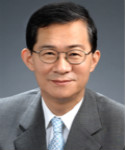| Biography | |
|---|---|
 Prof. YoungPak Lee Hanyang University, Korea/ Fudan University, China |
|
| Biography: YoungPak Lee received his B. S. degree from Seoul National University, Korea, in 1975, and the Ph. D. degree in experimental condensed-matter physics in 1987 from Iowa State University, U. S. A. His research involved study on magneto-optical, magnetic, optical and transport properties, and electronic structures of thin films and nanostructures, characterization of the surfaces and interfaces of thin films including multilayers, vacuum science, and so forth since his Ph. D. degree. After many careers in U. S. A., Japan, Germany and Korea, he is now former President of the Korean Physical Society, former President of the Korean Federation of Basic-science, Distinguished Professor, Physics Department of Hanyang University, and Director of Quantum Photonic Science Research Center, Seoul, Korea, which exploited the convergence research of magnetism and optical science. Prof. Lee is also Member of Korea Academy of Science and Technology, Council of Association of Asia-Pacific Physical Societies, Honorary Member of National Academy of Sciences of Ukraine, Distinguished Visiting Professor of Aix-Marseille Univ. (France) and Edith Cowan Univ. (Australia), Guest Distinguished Professor / Professor of 7 Chinese Universities and Institutes, Scientific Advisor of Scientific Council of Materials Science of Vietnamese Academy of Science and Technology. His current investigations include metamaterials and spin-photonic crystals, nanoscopic investigation of morphology and magnetic domain, and magnetic semiconductors based on oxides. He has published 640 SCI papers (the total published number of papers : 750 papers) as of December 2014. Because of these achievements, he has received many kinds of awards (48 awards as of December 2014), including the highest-level Award from the Korean Physical Society (2014), Award by the Korean Minister of Education, Science and Technology (2009), Award by the Korean Minister of Science and Technology (1992), and various academic-paper awards and academic-achievement awards. Based on these recognitions, he was also selected as one of the 'Korean Scientists for the 21st Century' by a main national broadcasting company in 2007. He has led the globalization of Korean physics, based on the leadership in the research on quantum photonic science. So far, he has established the global collaboration network with 42 organizations in 15 countries, including the U. S. A. and China. | |
